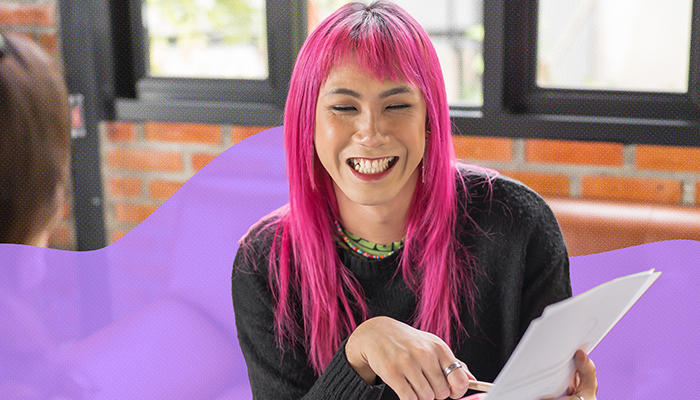Coming out, whether it’s for the first time or as an ongoing process, can be both anxiety-producing and empowering, no matter what age you are. While living openly and authentically is many people’s goal, it may not always be that easy, especially at school. Maybe you have a few friends you want to share with, but you’re worried about more people knowing. Maybe there’s a supportive teacher you can talk to, but others you’re not so sure about. Maybe you want your friends to know, but not your parents. Or maybe you are ready to tell the whole world and just want some tips!
However you identify and however you are feeling, know that many before you have walked this path. There is no right or wrong way to come out, and it’s always your choice. Whether you identify as bisexual, gay, lesbian, queer, or something else, or you’ve come to realize you are nonbinary, transgender, genderqueer, or another gender identity, you deserve to be celebrated and seen as who you are. If you can’t find that where you are right now, know that there are spaces and communities out there ready to welcome you. We at FOLX are cheering you on!
Here are some tips to help you navigate coming out at school, if and when you want to.
1. Assess the risk and trust yourself.
Know it is okay to prioritize your safety first and foremost. You don’t have an obligation to disclose your gender identity or sexual orientation to anyone. You can choose when and where to tell others. For some people, delaying coming out makes the most sense to preserve their safety. It’s real that coming out can have consequences on your life and relationships. If your home or school isn’t LGBTQ+ friendly, you may feel more protective over your identity, and that’s okay.
If you live in a more supportive place, and have a more LGBTQ+ friendly school or community, you may have an easier time. (We wish this for everyone, and we’re working for this to be true for all of us in the future!) For some people, the emotional and mental safety of being yourself is worth the risk, no matter your environment. Whatever you feel, trust your intuition. Coming out isn’t linear, and no one’s timeline is the same.
2. Come up with a plan.
Once you’ve decided to come out, being proactive can help you manage your emotions around the process. Figure out how you want to come out, who you want to come out to, and whether you want to announce it online, just to a few close friends, or to a trusted adult in person. You may also want to think about ways you might respond if you get a response that is unexpected. This way, you can feel more comfortable going into it knowing you have thought through some different scenarios.
Many people choose to come out to the person or people they feel safest or most comfortable with first. This can help ease you in and give you a boost of confidence! These people can also help you navigate harder conversations. Maybe a school counselor can help you make a plan to come out to your teachers. Maybe your bestie can help you think about how you might want to respond if a classmate is less than positive about your news.
Also, think about how you can take care of yourself after big moments. Do you have a quiet place on campus you can go chill out? Do you have music that pumps you up? Or maybe a funny TikTok video you get to watch later? Is there a special shirt or piece of jewelry that makes you feel special? Can you go get some ice cream after school? Give yourself what you need as you do this big thing!
3. Change your name and pronouns wherever you can.
If you are coming out as trans or nonbinary, you might have chosen a new name or set of pronouns. You might want to ask your teachers ahead of time to use your new name and pronouns or request to update your email address or ID card. While many schools allow students to change their names and/or pronouns, some schools may say no. It’s important to emotionally prepare for this and find allies who will be in your corner.
You can also ask for help on this. If your parents are supportive, they can help work with the school. If you have a great school nurse, counselor, or teacher, they can also help you get these changes made. Think about whether you want to announce your new name if you get called the wrong one on the first day of school or if you want to try to get to classes early to have private conversations with teachers.
4. If safe, get some affirming clothes or accessories.
Clothes and accessories can be used to affirm a person’s gender identity or expression or sexual orientation. If you can afford it, this could warrant a fun shopping trip. Thrift stores are also an easy and cost-effective way to shop for new looks. Or you might be able to find something like a rainbow pin to put on your backpack. If shopping in a new gendered section makes you particularly anxious, bring a buddy along with you.
You may want to double check your school’s dress code or ask a trusted support if there’s anything you need to keep in mind.
5. Set expectations.
The first few days after coming out are important for establishing expectations for how others will respond. While we cannot control how others treat us, we can control how we respond to how they treat us. If you feel up for it, set boundaries and correct people on day one if they say offensive things or don’t use the correct name or pronouns.
This is also another great place to enlist support from a friend, family member, or teacher to help correct people if you want that. You’re also always allowed to walk away from people who aren’t treating you well or change how or what time you spend with people depending on how they treat you. You deserve to be around people who make you feel great.
6. Be your own advocate.
We hope you are fully embraced with a rainbow parade! But you may experience negative backlash for coming out from family, friends, or other people at school. If so, self-advocate for how you should be treated. You can always lean into your support network or try and find an affirming therapist or school counselor who can help you navigate these dynamics.
Coming out is a lifelong process. If it goes great the first time - that is awesome! If you or the other person stumbles, that’s okay too. Try to give yourself and other people grace in this process. Sometimes you’ve had a long time to think about these things but it’s very new to the person you are telling. It is expected that some of them might have big feelings, reactions, or questions. It’s not your job to take care of other people’s reactions to you, but it can be helpful to be aware that this might occur.
If you need extra support, online spaces can be a great place to come and find community. So can your local LGBTQ+ center. We hope you have a long and wonderful journey of coming out when and if it feels good to you. Whenever you’re ready, we’re cheering you on. You’ve got this!



